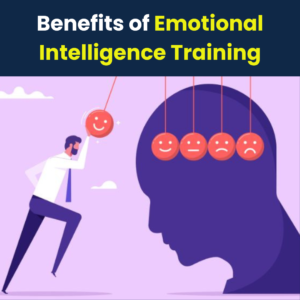As rapid evolution in Artificial intelligence (AI) continues to reshape our world, the most crucial question arises. What unique skills will define the role of people in this evolving landscape? While AI has already mastered data analysis, task automation, and even decision making, there is still one cognitive trait that stays distinctly human- Emotional Intelligence (EQ).

As AI becomes more common in our work and personal lives, the ability to understand, manage, and navigate emotions will be crucial for individuals and organizations to have a competitive edge. This is because the qualities that make us human, like empathy, self-awareness, and the ability to connect with others, are what will set us apart from the rapidly advancing technology around us. The rise of automation and AI are changing how we work, affecting job roles in industries like high-tech manufacturing where many redundant tasks can now be done automatically, making things faster and more efficient. AI’s impact on the workforce is multidimensional. On one hand, AI automates repetitive and routine tasks, enabling employees to focus more on complex and creative work. However, this process also raises concerns about job displacements and shifts in the demand for specific types of jobs.
Emotional Intelligence (EI) is a critical aspect of personal and professional development, it is the ability to recognize, understand, manage and reason with the emotion. EI is composed of key components such as self-awareness, self-regulation, empathy, and social skills. The importance of EI cannot be overstated, as it plays a vital role in fostering effective leadership, enhancing teamwork, and improving decision-making processes. Leaders with high EI are better at understanding their own emotions and those of their team members, enabling them to navigate complex interpersonal dynamics and foster a collaborative, supportive work environment. In a team setting, EI allows individuals to better comprehend and respond to the emotional needs of their colleagues, leading to improved communication, conflict resolution, and overall team cohesion. Moreover, EI-driven decision-making often involves considering the emotional implications of choices, leading to more well-rounded and impactful outcomes.
“According to a report by the World Economic Forum, emotional intelligence is expected to be one of the top 10 job skills in 2025.”
Even though AI has come a long way, there are still some drawbacks to the system. While AI is great at tasks like pattern recognition, data processing, and algorithmic decision-making, it is not as good at things like emotional intelligence, creative problem-solving, and contextual understanding, which call for more human-like skills. No matter how advanced, AI systems are unable to replicate human emotional awareness and social abilities, which are necessary for successful interpersonal collaboration, empathy, and communication. This is where EI plays a critical role in balancing the limits of artificial intelligence.

Lately, EI is becoming a more important component of corporate training programs since they help to create a positive and efficient work environment. As these programs recognize the importance of emotional intelligence training in improving interpersonal connections and overall organizational success, they are becoming more and more popular within corporate environment. Corporate training programs that promote emotional intelligence have the potential to greatly benefit both company and individuals. Employees acquire significant skills in empathy, conflict resolution, and self-awareness, which enhance teamwork and communication. Investing in emotional intelligence training has several benefits for the companies, such as decreased turnover of employees, better productivity, and higher employee engagement etc. Corporate training initiatives that prioritize emotional intelligence can help companies develop a workforce that possesses the interpersonal skills required to succeed in the highly competitive business environment of today.
As AI continues to automate processes and revolutionize the workforce, EI has become increasingly important. EI enables people to manage the ever-changing world by promoting teamwork, empathy, and flexibility—skills that enhance AI capabilities. For a seamless transition and the best possible fusion of AI and human strengths, people and organizations together need to place a high priority on the development of emotional intelligence. We can use technology to its full potential while maintaining the human element that is necessary for meaningful advancement by developing Emotional Intelligence. The future of work will be shaped by the symbiotic relationship between AI and EI, which will create a more rewarding and balanced environment where human potential and technology thrive together.





Leave a Reply